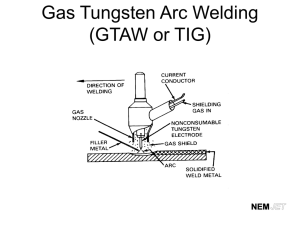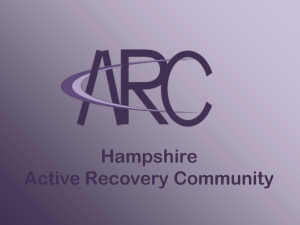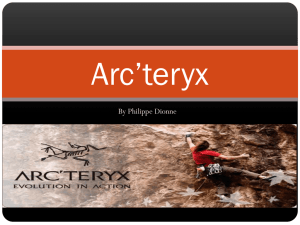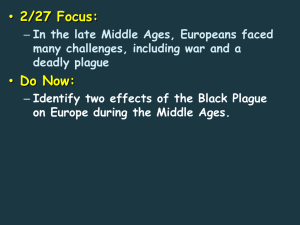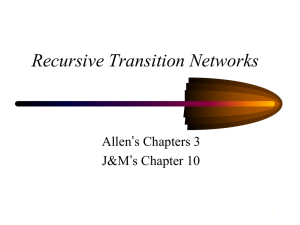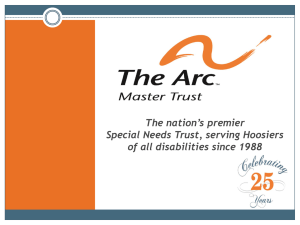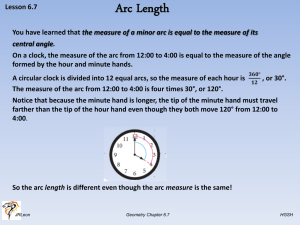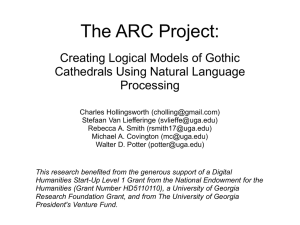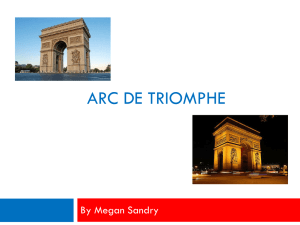PowerPoint - Australian Research Council
advertisement
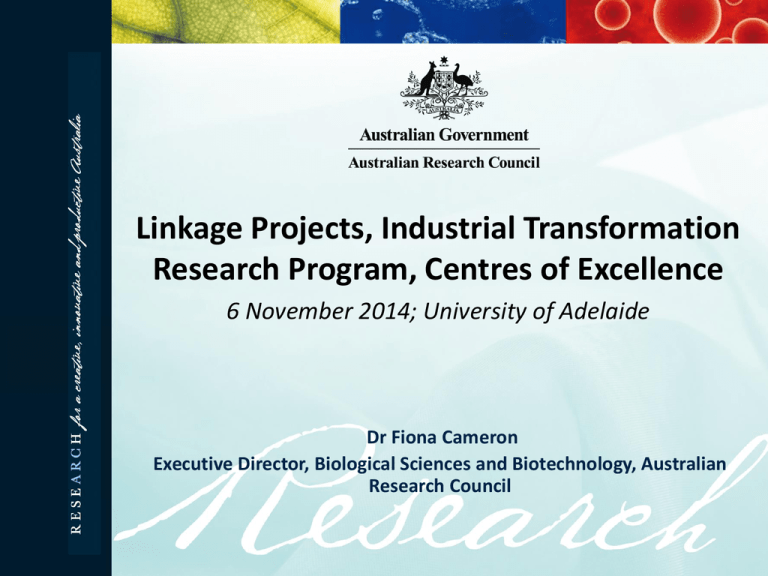
Linkage Projects, Industrial Transformation Research Program, Centres of Excellence 6 November 2014; University of Adelaide Dr Fiona Cameron Executive Director, Biological Sciences and Biotechnology, Australian Research Council Topics for Today • • • • Overview of the ARC Grants lifecycle and stats Insights into the grants process and funding schemes: – LP – ITRP – Centres of Excellence Web: arc.gov.au I Email: Communications@arc.gov.au Commonwealth Investment in R&D 2014-15 ARC NCGP Programs & Schemes Web: arc.gov.au I Email: Communications@arc.gov.au Types of ARC Centres Web: arc.gov.au I Email: Communications@arc.gov.au ARC funding to University of Adelaide 2007-2013 Web: arc.gov.au I Email: Communications@arc.gov.au ARC funding by institute 2010 - 2014 NCGP Grants Lifecycle The Grants Peer Review Process The Grants Peer Review Process LP The Linkage Projects scheme objectives • initiation and/or development of long-term strategic research alliances between higher education organisations and other organisations, including industry and end-users, in order to apply advanced knowledge to problems and/or to provide opportunities to obtain national economic, social or cultural benefits; • scale and focus of research in Strategic Research Priorities; • opportunities for researchers to pursue internationally competitive research in collaboration with organisations outside the higher education sector, targeting those who have demonstrated a clear commitment to high-quality research; and • growth of a national pool of world-class researchers to meet the needs of the broader Australian innovation system. Web: arc.gov.au I Email: Communications@arc.gov.au Some Linkage Stats: Funding and Success Rates Since 2005 there have been nearly 2200 instances of collaboration with Australian private companies, as partner organisations on linkage grants. Web: arc.gov.au I Email: Communications@arc.gov.au Success Rate: Comparison of Schemes Web: arc.gov.au I Email: Communications@arc.gov.au Updated LP15 Rules- changes • Workshops, focus groups and conference costs that are necessary for the conduct of the proposed research may now be supported. All requests must be fully justified in the Proposal form. • Travel costs essential to the Project are permitted up to a maximum average of $20,000 per year of the Project. Web: arc.gov.au I Email: Communications@arc.gov.au Updated LP15 Rules- changes cont. • The Funding Rules now do not require a Partner Investigator from each Partner Organisation. • A Project may now be applied for and awarded funding for a minimum of two to a maximum of five consecutive years. Web: arc.gov.au I Email: Communications@arc.gov.au Grants outcomes DP15 • 5 year grants • Important to justify budgets!! Web: arc.gov.au I Email: Communications@arc.gov.au LP Linkages University of Adelaide 2011-14 Web: arc.gov.au I Email: Communications@arc.gov.au LP Linkages SA 2011-14 Higher Education Government Commercial Non-profit/other Web: arc.gov.au I Email: Communications@arc.gov.au LP Linkages Australia 2011-14 Web: arc.gov.au I Email: Communications@arc.gov.au Instances of international collaboration on approved proposals in Linkage Projects 2014 Web: arc.gov.au I Email: Communications@arc.gov.au Gender balance LP Web: arc.gov.au I Email: Communications@arc.gov.au Gender of First CI: LP14 Web: arc.gov.au I Email: Communications@arc.gov.au Details of the Industrial Transformation Research Program – the Schemes Overall objectives: • foster important partnerships between business and universities; • support researchers (higher degree by research & post doctoral fellows to gain ‘hands-on’, practical skills and experience in important areas. Consists of two schemes: • Industrial Transformation Research Program • Industrial Transformation Training Centres Web: arc.gov.au I Email: Communications@arc.gov.au Industrial Transformation Research Hubs Objectives • encourage collaborative R&D projects to address challenging industry issues solved through innovative research relevant to the Industrial Transformation Priorities; • leverage local and international investment in targeted industry sectors. Web: arc.gov.au I Email: Communications@arc.gov.au IH14 changes to Funding Rules • The Funding Rules do not support Medical Research.* • Travel costs essential to the Project are permitted up to a maximum average of $20,000 per year of the Project • *Exception: ITRP Priority “medical devices and biotechnology” (See FAQs) Web: arc.gov.au I Email: Communications@arc.gov.au Industrial Transformation Research Hubs Opportunities for universities and industrial partners to focus on significant collaborative R&D projects with outcomes beyond their independent endeavours. • The ARC will invest up to $1 million per year in each Research Hub with matching investment by industry partners up to a maximum of five years Web: arc.gov.au I Email: Communications@arc.gov.au Industrial Transformation Training Centres Objectives • foster opportunities for Higher Degree by Research candidates and postdoctoral fellows to pursue industrial training and to enhance competitive research in collaboration between universities and organisations outside the Australian higher education sector; and • Strengthen Australia’s Industrial Transformation Priorities to supplement the capabilities of industries and other research end-users. Web: arc.gov.au I Email: Communications@arc.gov.au Industrial Transformation Training Centres (ITTC) To foster close partnerships between university-based researchers and industry to provide innovative training for early career researchers vital to Australia’s future industry. Over the life of the program the ARC will enable: • establishing Training Centres nationwide • support Higher Degree by Research candidates and postdoctoral researchers in gaining real-world practical skills through placement in industry • provide a minimum of $650,000 for the first three years, a minimum of $150,000 in the fourth year and no minimum in the fifth year, and a maximum of $1 million per year for up to 5 years for each Training Centre. Web: arc.gov.au I Email: Communications@arc.gov.au IC15 changes to funding rules • • • The Funding Rules do not support Medical Research. (Exception Medical Devices) A Project may be applied for and awarded funding for four (4) or five (5) consecutive Years Applicants may now request: – a minimum of $650,000 funding from the ARC per year for the first three years, and – • a minimum of $150,000 funding from the ARC in the fourth year. – There is no minimum level of ARC funding for the fifth year provision for salary support for a Training Centre Manager. • Others: see ARC website Web: arc.gov.au I Email: Communications@arc.gov.au Previous Rounds and success rates Web: arc.gov.au I Email: Communications@arc.gov.au Success rates for Industrial Transformation Priorities funded Industrial Transformation Research Hubs in “2013” (Round 2) Large Investments in excellence for the longer term • Industrial Transformation Research Program – Hubs $500K to $1m a year for up to five years – Centres $650K to $1m a year for up to five years • Co-funded and Special Research Initiatives – various funding and duration • ARC Centres of Excellence $1-4 m a year for up to seven years Web: arc.gov.au I Email: Communications@arc.gov.au The ARC Centres of Excellence - overview ARC Centres of Excellence involve significant collaboration with: • universities • publicly funded research organisations • other research bodies • government • business in all fields of research except medical and dental research Web: arc.gov.au I Email: Communications@arc.gov.au The ARC Centres of Excellence – Objectives a) highly innovative and potentially transformational research that aims to knowledge; b) interdisciplinary, collaborative approaches to c) develop relationships and build new networks d) build Australia’s human capacity in a range of; e) postgraduate and postdoctoral training f) large-scale problems over longer periods of g) points of interaction between unis, business, govt, private sector Web: arc.gov.au I Email: Communications@arc.gov.au What the Centres need to look like • The Centres are the largest investments of the ARC Grants Program • Centres foster frontier interdisciplinary research – with innovative and highly integrated Research Programs • Centres are critical for the next generation of researchers – capacity building • Leading the way – international reputation • Building on important collaborations • Public benefits and research impact Web: arc.gov.au I Email: Communications@arc.gov.au Key features of a Centre Director • • • • • • • • • • • Have a big vision Be outward looking Have a compelling research question Be able to explain this to a broad audience (get mock panels from broad disciplines to evaluate the proposal) Propose topical and practical research, but also blue sky with unexpected outcomes Be a mentor and a leader at the cutting edge of your field, able to take the research to an internationally outstanding level It is not about what you have done, but what you are going to do Teamwork is important: have the ability to pull together all the right people, in an effective manner Be a centre builder Not be at the end of your career; what is the legacy this proposal will leave to the next generation in terms of project outcomes and resources? If at regional university, demonstrate strong research commitment Web: arc.gov.au I Email: Communications@arc.gov.au Centres of Excellence Next Round, CE17 Consultation • Process • EOI requirements • Feedback *BSB = Biological Sciences and Biotechnology; EMI = Engineering, Mathematics and Informatics; HCA = Humanities and Creative Arts; PCE = Physics, Chemistry and Earth Sciences; SBE = Social, Behavioural and Economics Sciences Source: 2014 Selection Report Table 1 Web: arc.gov.au I Email: Communications@arc.gov.au The ARC Centres of Excellence - timelines Web: arc.gov.au I Email: Communications@arc.gov.au RMS 2.0 ARC successfully launched Release 1 of RMS 2.0 on Thursday 21 August 2014. • RMS 2.0 is a more intuitive system that offers: – Improved workflow – Enhanced navigation – Faster PDF generation, and – Other technical improvements • To assist the use of RMS 2.0, information is available on the ARC internet, & through Research Offices. • As new functionality is added to RMS 2.0 more information will be provided to users. Web: arc.gov.au I Email: Communications@arc.gov.au RMS 2.0 – Release 1 • Since the release the ARC RMS Help Desk has received queries in relation to: – Password resets – Updating org and user details • Questions received will be thematically represented as FAQs and published on the internet to assist all users. • Feedback – RMS helpdesk rms@arc.gov.au or 02 6287 6789 Web: arc.gov.au I Email: Communications@arc.gov.au

